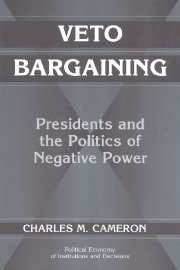Book contents
- Frontmatter
- Contents
- List of Tables and Figures
- Preface
- 1 Divided Government and Interbranch Bargaining
- 2 A Natural History of Veto Bargaining, 1945–1992
- 3 Rational Choice and the Presidency
- 4 Models of Veto Bargaining
- 5 Explaining the Patterns
- 6 Testing the Models
- 7 Veto Threats
- 8 Interpreting History
- 9 Conclusion
- References
- Index
- Titles in the series
7 - Veto Threats
Published online by Cambridge University Press: 20 January 2010
- Frontmatter
- Contents
- List of Tables and Figures
- Preface
- 1 Divided Government and Interbranch Bargaining
- 2 A Natural History of Veto Bargaining, 1945–1992
- 3 Rational Choice and the Presidency
- 4 Models of Veto Bargaining
- 5 Explaining the Patterns
- 6 Testing the Models
- 7 Veto Threats
- 8 Interpreting History
- 9 Conclusion
- References
- Index
- Titles in the series
Summary
Let them be forewarned, no matter how well intentioned they might be, no matter what their illusions may be, I have my veto pen drawn and ready for any tax increase that Congress might think of sending up. And I have only one thing to say to the tax increasers: Go ahead and make my day.
President Ronald Reagan (Berman 1990:12)Repeatedly I have said there are right ways and wrong ways to cut the deficit. This legislation [H.R. 15161, FY 96 Foreign Aid and State Department Authorization] is the wrong way. We did not win the Cold War to walk away and blow the opportunities of the peace on shortsighted, scattershotted budget cuts and attempts to micro-manage the United States foreign policy. If this bill passes in its present form I will veto it.
President Bill Clinton (CQ Weekly Report, May 27, 1995:1514)Veto threats pose a puzzle. The political struggles between the president and Congress are not the verbal sparring matches of college debating societies. They involve real stakes: redistributing wealth, creating rights, making war. But a veto threat is just words. How can the president's verbal posturing, mere words, make much difference in high-stakes bargaining? The problem is a general one in political science. “Actions speak louder than words” is a profound principle of politics, and one that is easy to understand. But why should words, the sheerest “cheap talk,” speak at all? Yet they seem to. Rhetoric often has a profound influence on the course of bargaining.
- Type
- Chapter
- Information
- Veto BargainingPresidents and the Politics of Negative Power, pp. 178 - 202Publisher: Cambridge University PressPrint publication year: 2000



